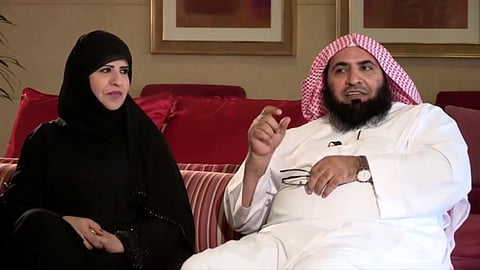Saudi scholar denies fatal shooting rumours
Al Ghamdi in the eye of storm after saying Muslim women could appear in public without the niqab

Manama: A Saudi religious scholar embroiled in a controversy after he said that Muslim women could appear in public without the niqab, the face-covering veil, has denied rumours that he had been fatally shot.
“I am faring well and I have not been targeted by any would-be assassin,” Ahmad Al Ghamdi said on Saturday. “The rumours circulated on social networks are groundless and lack credibility. Such claims had been spread before and it seems they are being repeated,” he said, quoted by local news site Al Marsad.
The scholar, who was at one time the head of the Makkah branch of the powerful Commission for the Promotion of Virtue and the Prevention of Vice, said that he was not aware of the source of the allegations about his assassination.
“I do not know who is behind them, but I do know they disturbed me and my family. “I have received calls from my relatives, friends and acquaintances to inquire about my condition,” he said.
Al Ghamdi has waded into the controversy after he insisted Muslim women had the choice to wear the niqab and that it should not be imposed.
To support his argument, he appeared last on a television programme with his wife who was covering her head, but not her face, in a sharp contrast with the deep-rooted Saudi tradition.
The opinion on the status of the niqab and the television talk show appearance set off a tsunami of criticism and charges he was deliberately and maliciously undermining social values, inciting Saudi women to debauchery and challenging local traditions.
On Thursday, it was announced a number of Saudis in Jeddah were planning a lawsuit against the cleric for encouraging women to show their faces. Online, some shared a picture of Al Ghamdi and his wife sitting close with a blond woman with her arms exposed.
In Saturday’s interview on Badria, his wife acknowledged that her husband’s religious statements had already caused some problems for her family. “Our children complain that some teachers tell them: why does your father say this and that?” she said.
On Monday, Grand Mufti Shaikh Abdul Al Aziz Al Shaikh said that Muslim women had a duty to wear full hijabs and requested Al Ghamdi to repent
“There are those who said that it was all right for women to show their faces to strangers and that the veil is a social tradition, and not a religious order. This is wrong because covering the face is a religious obligation,” the highest religious figure in Saudi Arabia said. “Some brothers even took the step to show their wives in public. This is a very dangerous thing. We pray to God to guide them to the true path and help them repent. My message to Al Ghamdi is to fear God and to repent,” he said.
Other people, including religious figures and social media users, said they were looking into ways to file lawsuits against Al Ghamdi.
However, some voices of moderation called for reining in partisan fanaticism and adopt rational attitudes towards the issue.
“Those who wish to discuss this case must be careful not to insult anyone,” Sahikh Adel Al Kilani, a religious scholar, said. “There should be no accusations without hard evidence or proof. There are schools of thought that allow it and others that oppose it. No woman should be vilified or accused for making either decision. People need to be very cautious not to accuse any woman of debauchery because there are some prominent scholars who had allowed it,” he said.
Eisa Al Gaith, a member of the Shura Council, the national consultative institution, said there was no consensus over the issue of the niqab.
“Women should not be condemned for not wearing one since they adhere to a school of thought that does not make it compulsory,” he said. “However, the niqab cannot be dismissed in a village or area where all women wear it in order to ensure there is no troubling confusion. There is a need to appreciate the situation from various angles. A court for instance cannot force a woman to wear a niqab as per the wishes of her husband. Religious scholars and thinkers should rise above the comments made on social networks by common people who do not possess enough knowledge about religion. At the meeting of the Muslim Scholars, there was a woman at the podium whose face was not covered,” he said.
Al Gaith attributed the severe onslaught on Al Ghamdi to his affiliation.
“If Al Ghamdi was a member of the Muslim Brotherhood, the attack would not be so severe because the issue is basically related to affiliations. The wives of some of our most prominent Muslim Brotherhood scholars do not cover their faces both in Saudi Arabia and abroad. Some of them take off the niqab once they are on the plane. It is a fact and let us not pretend otherwise,” he said.



